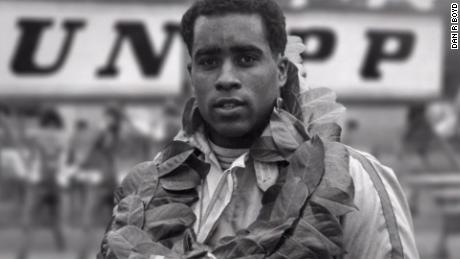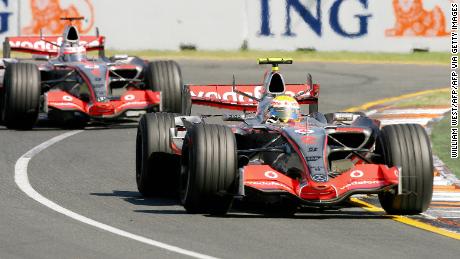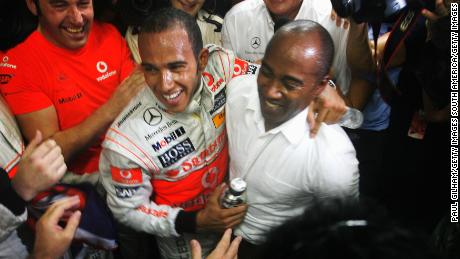Lewis Hamilton, Formula One’s voice and conscience

"There's a downhill section on this track into a hairpin bend and there was little Lewis Hamilton, and he was small in those days, coming down, leading the pack of these little karts that sing along like bumblebees and he was just extraordinary even in those days," David Richards, chairman of Motorsport UK, tells CNN Sport of the first time he saw Hamilton — who was on the same karting team as his son — race. "He was quite shy, but he and his father had an exceptional rapport with each other, and they just got down and did the job better than anybody else and it stood out even in those days. He went from class to class, from strength to strength, and I think it's easy to be flippant and say he was a future world champion at eight years old, but you could see he had standout talent that's for sure."By now, the world is familiar with Hamilton's body of work. As a six-time world champion, he is the second most successful Formula One driver of all time, one title behind Michael Schumacher's seven which few would wager against him passing. The Englishman has won 83 races, again only Schumacher has more, and no driver has secured more pole positions than Hamilton's 87. Whatever he achieves in the years ahead, Hamilton's place in F1's pantheon is assured. The 35-year-old has long been the face of F1, his domination of the sport and heart-on-sleeve personality has made him arguably the most recognizable British sportsman on the planet, but in the last few months especially, as one of British sport's leading voices supporting the Black Lives Matter movement, Hamilton has become, says Richards, the sport's conscience, too. No world champion in F1 history has used his stature like Hamilton, the sport's first and only Black world champion in its 70-year history. While three-time world champion Jackie Stewart campaigned to make F1 a safer sport, none have stood up against injustice and tried to help sweep down the walls of oppression. Earlier this month, the Briton said he was "completely overcome with rage" at the sight of George Floyd's death and called out the rest of the F1 grid, and the sport itself, for remaining silent. In June alone he has attended a peaceful protest in London, urged people to "keep pushing" for change, backed anti-racism demonstrators who tore down a statue of 17th-century slave owner in Bristol, southwest England, and has announced plans to set up a commission in his name to increase diversity in motorsport. F1 has come under intense pressure from Hamilton to reform and, at long last, appears to be listening. In what Hamilton has described as an "important statement," Mercedes unveiled an all-black car for this season in solidarity with Black Lives Matter. The halos of both cars will feature the call to "End Racism," while Toto Wolff, the team principal, revealed that Mercedes would review its recruitment policy. The last few months epitomizes how in recent years Hamilton has, in Richards' words, "become his own person.""He's come out of his shell. He's expressed his opinions very eloquently and he's not afraid to stand up for his own beliefs," says Richards, whose own organization has said in a statement that it is committed to "making a positive contribution to wider society."Hamilton, a vegan who has contributed back-up vocals on a Christina Aguilera song, has opinions and interests away from the sport and champions many subjects close to his heart, from the environment and fashion to music. Sometimes, especially when moralizing on the environment, he has come under criticism for the perceived hypocrisy of once owning a private jet and competing in a gas-guzzling sport.But it is on the lack of diversity in his sport he has been loudest. Willy T. Ribbs, the first Black driver to test an F1 car and compete in Indy 500, describes Hamilton as "the band leader." "He's broadened the sport worldwide to people of color. He has a right to take a position and take a stand for humanity. That's what he's doing," Ribbs, who did not have the resources or backers to succeed in F1, tells CNN's Amanda Davies.Across Mercedes, only 3% of the workforce belong to minority ethnic groups, while just 12% of employees are women, says the company. Hamilton may have blown off the doors when he made his grand prix debut in 2007, but he remains the sole Black driver on the grid. This is a sport where the wheels of change turn painfully slowly and, as Hamilton himself has said, "the institutional barriers that have kept F1 highly exclusive persist."Perhaps it wasn't too much of a surprise then, that when recently asked by CNN Sport whether F1 should have done more to address the issue of diversity and inclusion, the sport's former supremo Bernie Ecclestone said: "I don't think anyone bothered about it before." In the same interview, Ecclestone said, "Black people are often more racist than White people," comments F1 condemned and Hamilton described as "sad and disappointing.""It makes complete sense to me now that nothing was said or done to make our sport more diverse or to address the racial abuse I received throughout my career," wrote Hamilton in an Instagram post. Last year Wolff told an assembled media before a grand prix that Hamilton carried permanent scars from the racist abuse he experienced in karting. "If as a child, you have had to overcome abuse and discrimination, on one side it makes you a stronger personality. But on the other it also leaves scars," Wolff said.In 2008, Hamilton suffered racist abuse in Spain during a test session at the Circuit de Catalunya in Barcelona. Ten years later, referring to F1's diversity, Hamilton said "nothing's changed in the 11 years I've been here." The Briton's own incredible story is an example of how notoriously difficult the sport is to enter, mainly because of the financial costs involved. His father, Anthony, juggled three jobs, re-mortgaged the family home and dipped into his life savings to keep his son in karting. Growing up at first in a council-owned house in Stevenage, a town 30 miles north of London, Hamilton's life was not one of privilege, though neither was it "the slums," as he would once later describe his hometown. The Hamiltons put everything on the line so that a prodigious talent could succeed.As Hamilton's younger half-brother, Nic, who has cerebral palsy and competes in the British Tour Car Championship, once told British newspaper the Daily Telegraph: "We would pile in the van, drive five hours to Scotland for a race, stay out of school because of it. It required huge dedication from everybody … And it was all to get Lewis where he is today."
The race that defined a career
 It was in Melbourne, 2007, that Hamilton announced his talent to the world, in a race that would define the rest of his career as he displayed the boldness for which he has become known. For his first grand prix, Hamilton had qualified fourth. Heading into the 90-degree first corner, the novice found himself trapped on the inside by Robert Kubica. Backing off momentarily, he darted behind the Polish driver and took him on the outside, overtaking his teammate, two-time world champion Fernando Alonso, in the process, to move to second. Maurice Hamilton, in Australia covering the race for British newspaper The Observer, tells CNN Sport: "He didn't stand on ceremony, he didn't say 'oh Fernando, you're an experienced guy I'm just going to follow you and learn the ropes.' At the first corner of the first race, he drove around the outside of Alonso, coming round the corner, and Alonso couldn't believe it, and neither could we. "That was a sign that he had not just the ability to do that and not have the car spin off the road, but also the confidence to take him on, to say 'no, I can be ahead of you, I don't care who you are, I'm going to pass you,' and he did and he just went on from there and just got better."Hamilton did not need time to find his feet, finishing championship runner-up in his debut season before becoming, in 2008, the youngest F1 world champion in history as he secured the crown by a point in a dramatic season finale.
It was in Melbourne, 2007, that Hamilton announced his talent to the world, in a race that would define the rest of his career as he displayed the boldness for which he has become known. For his first grand prix, Hamilton had qualified fourth. Heading into the 90-degree first corner, the novice found himself trapped on the inside by Robert Kubica. Backing off momentarily, he darted behind the Polish driver and took him on the outside, overtaking his teammate, two-time world champion Fernando Alonso, in the process, to move to second. Maurice Hamilton, in Australia covering the race for British newspaper The Observer, tells CNN Sport: "He didn't stand on ceremony, he didn't say 'oh Fernando, you're an experienced guy I'm just going to follow you and learn the ropes.' At the first corner of the first race, he drove around the outside of Alonso, coming round the corner, and Alonso couldn't believe it, and neither could we. "That was a sign that he had not just the ability to do that and not have the car spin off the road, but also the confidence to take him on, to say 'no, I can be ahead of you, I don't care who you are, I'm going to pass you,' and he did and he just went on from there and just got better."Hamilton did not need time to find his feet, finishing championship runner-up in his debut season before becoming, in 2008, the youngest F1 world champion in history as he secured the crown by a point in a dramatic season finale.  But it was after Hamilton surprisingly left McLaren, the only F1 team he had known, to join Mercedes, a team re-establishing itselRead More – Source
But it was after Hamilton surprisingly left McLaren, the only F1 team he had known, to join Mercedes, a team re-establishing itselRead More – Source
[contf]
[contfnew]

cnn
[contfnewc]
[contfnewc]

















